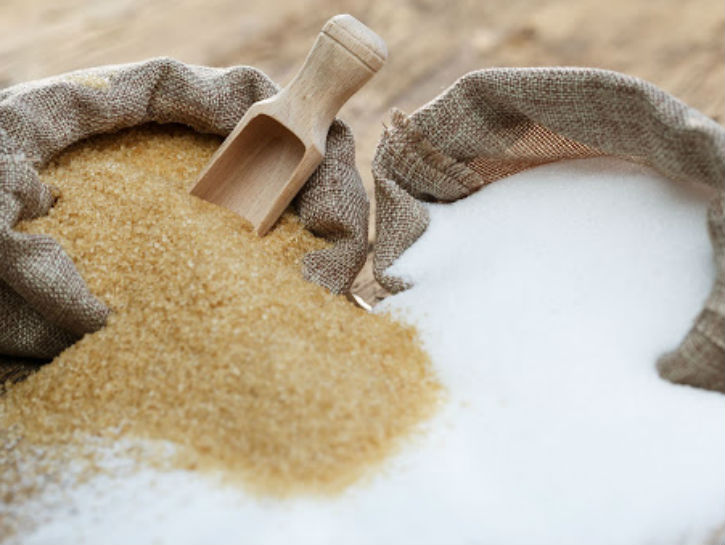When you are trying to limit calories and watch your weight, often the advice is to avoid white foods and products like white rice, white bread, and white flour. Instead, the healthier option is to go for brown rice and whole wheat bread and flour. But, what about when it comes to sugar? Is there any difference in brown and white sugar? And, could brown sugar actually be healthier?
How Sugar Is Made

Sugar comes from sugarcane plants that are crushed and then their juice is extracted. Once manufacturers remove the juice, they boil and filter it. The heating process produces molasses, which has very dark sugar crystals.
Then, to produce raw sugar (which looks brown), they spin in it in a centrifuge. For white sugar, they continue to process and granulate the crystals to make them finer and to remove the molasses. Then, to make brown sugar, manufacturers add molasses back into the refined white sugar.
What Is The Difference Between Brown Sugar And White Sugar?

The only actual difference between is that brown sugar has molasses and white sugar doesn’t.
The molasses does give the brown sugar a few more minerals than the white — a bit more calcium, potassium, iron, and magnesium. However, according to The New York Times, the amounts are so minute, that it doesn’t give brown sugar any real health benefit.
For example, one teaspoon of brown sugar has just .02 milligrams more iron compared to one teaspoon of white sugar. So, brown sugar and white sugar have an equal health risk, which means substituting brown sugar does not help with weight loss, and it is not recommended for people with diabetes.
And, because of the process of adding molasses back into the brown sugar, it is a more refined product than white sugar. Brown sugar is in no way healthier than white sugar.
The molasses in brown sugar does give it a slightly different taste compared to white sugar. Brown sugar comes in a variety of colors, and it usually contains between five and ten percent molasses, with the darker brown sugars containing the higher percentage. And, that tiny bit of syrup makes brown sugar have a little less concentrated sweetness than white sugar.
As for white sugar, it has no odor or color, and it has a neutral flavor.
Can You Substitute One For The Other?

Since there is not much difference between the two, you can usually interchange brown and white sugar when baking — if the chemistry isn’t important. But, your baked goods may have a different texture and color if you do make a substitution. Your items may end up being a little bit darker if you substitute brown sugar for white sugar. And, because brown sugar is naturally moist, your baked good could be a bit softer.
So, to compensate for this, when you are substituting brown for white, you might want to consider either slightly decreasing the amount of wet ingredients in your recipe or increasing the dry ones.
Texture is important when baking. You want to use brown sugar for things like banana bread, to achieve a moist, rich texture. But, if you are baking a cake, white sugar works better because it keeps it relatively dry.
When you are baking cookies, you can usually swap brown and white sugar without any problems, but it can result in changing the texture. If your recipe has baking soda, brown sugar reacts with it to produce carbon dioxide, and that means your cookie will be thick, puffy, and soft. But, white sugar won’t react with baking soda, and your cookie will be thin, dense, and crisp.

If the recipe involves mixing butter and sugar until it is light and fluffy, adding white sugar will produce a thick and puffy cookie, and brown sugar will make your cookies thinner, but they will stay chewy and moist.
And, in cookie recipes that call for soft or melted butter, white sugar will cause the cookie to spread more, take longer to set, and they will be thin and crisp. But, brown sugar will cause the dough to set quickly, and your cookie will be thick and chewy.
When a recipe requires both white and brown sugar, it’s an attempt to get the best flavor and texture from each kind. Again, you can substitute if you need to, just be aware of how it will adjust the texture and color.
The Verdict
Even though brown and white sugar have gone through a slightly different process, there is essentially zero difference between the two when it comes to your health. Substituting brown sugar in your recipes still gives you the same amount of calories as white, and it often makes your baked goods darker and softer.
If you are trying to lose weight or wanting to make your diet as healthy as possible, when it comes to sugar, it is all about consuming moderate amounts, no matter what color.
